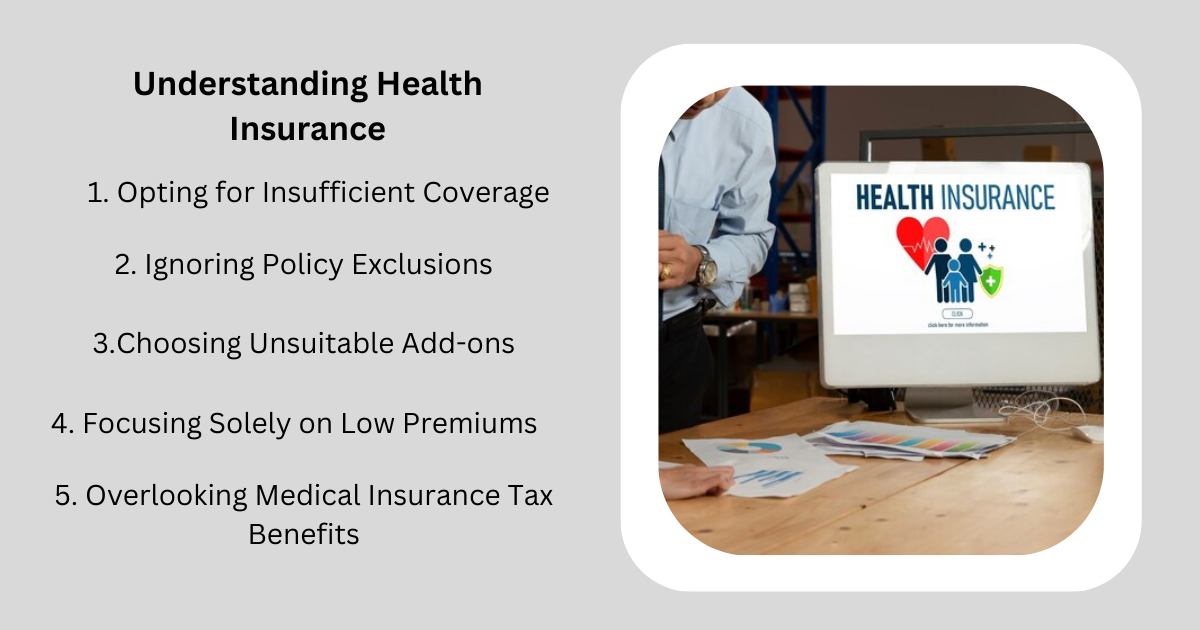In today’s fast-paced world, securing your health with the right insurance is more crucial than ever. However, navigating the complexities of health insurance can lead to costly mistakes. In this article, we will explore the top five health insurance mistakes to avoid, ensuring you make informed decisions that protect your financial future.
Understanding Health Insurance

Health insurance is designed to cover medical expenses, providing a safety net during emergencies. Yet, many individuals make errors that can jeopardize their coverage and financial stability. By understanding common pitfalls, you can safeguard yourself against unexpected medical costs.
1. Opting for Insufficient Coverage
One of the most significant mistakes individuals make is choosing a policy with inadequate coverage. While low premiums may seem appealing, they often come with limited benefits. Comprehensive health insurance should cover:
- Hospitalization
- Pre- and post-hospitalization expenses
- Daycare treatments
- Cashless treatment across a wide network of hospitals
Without sufficient coverage, you risk facing substantial out-of-pocket expenses during medical emergencies, undermining the very purpose of having insurance. Assess your family’s healthcare needs carefully and ensure your policy provides adequate protection.
2. Ignoring Policy Exclusions
Understanding what your policy does not cover is just as important as knowing its benefits. Common exclusions might include:
- Maternity care
- Critical illness
- Dental treatments
- Cosmetic surgeries
- Outpatient Department (OPD) services
Failing to review these exclusions can lead to unpleasant surprises when filing claims. Always read the fine print to understand your policy’s limitations and prepare for any uncovered expenses.
3. Choosing Unsuitable Add-ons
Add-ons and riders can enhance your health insurance policy by providing additional coverage options such as critical illness benefits or maternity coverage. However, selecting unnecessary add-ons can inflate your premium without offering meaningful benefits. For instance, opting for maternity coverage when you have no plans for a family soon is an avoidable expense. Carefully evaluate which add-ons align with your current health and life stage requirements before making a decision.
4. Focusing Solely on Low Premiums
While affordability is essential, prioritizing the cheapest policy can lead to inadequate coverage or poor service quality. Policies with extremely low premiums often come with:
- Limited coverage for critical illnesses
- High co-payment clauses
- A restricted network of hospitals for cashless treatments
Striking a balance between affordability and comprehensive benefits is crucial. Assess factors like claim settlement ratios and network hospitals before finalizing your policy.
5. Overlooking Medical Insurance Tax Benefits
One of the significant advantages of health insurance is the tax benefits it offers under Section 80D of the Income Tax Act. You can claim deductions on premiums paid for yourself, your family, and your parents. Ignoring these benefits means missing an opportunity to optimize your financial planning. For individuals below 60 years old, the maximum deduction is Rs 25,000 annually, while for senior citizens, it increases to Rs 50,000. Ensure that your policy aligns with your tax-saving strategies to maximize financial benefits.
Also Read : How To Compare Auto Insurance Policies For Maximum Savings
Conclusion
Avoiding these common health insurance mistakes is vital for ensuring comprehensive coverage and financial security in times of medical emergencies. By carefully evaluating your needs, understanding policy exclusions, and selecting appropriate add-ons, you can navigate the complexities of health insurance effectively.
FAQs
- What should I consider when choosing a health insurance policy?
- Evaluate your healthcare needs, compare policies based on coverage and premiums, and understand exclusions.
- How can I ensure I have sufficient coverage?
- Assess family medical history and potential healthcare needs to determine an appropriate sum insured.
- What are common exclusions in health insurance policies?
- Exclusions may include maternity care, cosmetic surgeries, dental treatments, and outpatient services.
- Why are add-ons important in health insurance?
- Add-ons provide additional benefits tailored to specific needs but should be selected based on necessity rather than impulse.
- How do tax benefits work with health insurance?
- Premiums paid for health insurance are eligible for tax deductions under Section 80D of the Income Tax Act.

